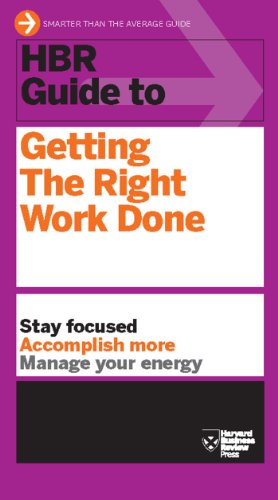
“Your inbox is overflowing. You’re paralyzed because you have too much to do but don’t know where to start. Your to-do list never seems to get any shorter. You leave work exhausted but have little to show for it.”
That’s the copy on the back cover of the “Harvard Business Review Guide to Getting the Right Work Done,” and I bet this little book speaks to a lot of people.
I finished reading it just yesterday (thanks for the loan, Allison!), and decided to incorporate two of the many helpful tips today while working from home:
- Establish a ritual
- Work in 90-minute cycles
Here’s What Happened
Work from home days are usually relatively free of meetings. At the office, the chunks of time that I have to work on things is dictated by the amount of time I have in between meetings. At home, while I might have a phone call here or there, I can devote most of my day to big projects or things I need to think about deeply or creatively. But with so much time and so few interruptions, I often struggle to focus and get started.
Today, I woke up at my usual time and did my morning routine exactly as I would have if I were going to the office. But instead of grabbing my keys and heading for the door, I grabbed my coffee and went upstairs to my office, where I jumped into today’s Big Project.
I worked for about 90 minutes straight and even though I was really on a roll, I interrupted myself to take a break. I got a snack, did a household chore, and let my eyes recover from Excel torture. Then I was back at it for another 90 minutes, until it was time to eat lunch.
After lunch, I had a phone call. After the phone call, you guessed it: another break, followed by one final 90-minute cycle.
During each of my 90-minute work cycles, I was thinking about my Big Project more clearly than I ever have and got so much done. I also didn’t burn out at 2:30 or 3:00pm like I usually do when I sit down and stay down all day.
What I Learned
Both of these tips come from chapters by Tony Schwartz.* Schwartz defines rituals as “highly specific behaviors, done at precise times, so they eventually become automatic and no longer require conscious will or discipline.” Taking some basic decisions out of my day (Should I sleep in? Should I work out? When?) and making them automatic (No. Yes. Now.) freed up some of my decision-making capacity for work-related tasks.
And those 90-minute cycles? It was all about syncing up my schedule with the one my body already has (or wants). Ignoring hunger pangs in the name of work isn’t admirable, it’s inefficient. By fueling and resting my body, I was able to work on my Big Project with more energy and a fresh set of eyes with every cycle.
The project isn’t getting any smaller, but it is getting more manageable. And to me, that’s a win in doing the right work.
*Yep, that Tony Schwartz.





2 Replies to “Rituals and Cycles”